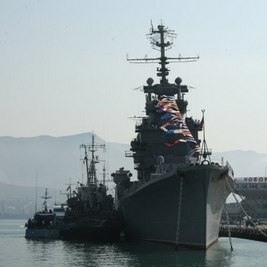Since the 2008 war with Georgia, Russia has regularly held military maneuvers on the Black Sea. This March, about 30 ships, 7,000 personnel, and more than 20 airplanes and helicopters participated in the “snap” drills of the Russian army on the Black Sea.
Vladimir Putin issued the order for the maneuvers from his presidential airplane on his return to Sochi after his visit to the Republic of South Africa.
In spite of the large-scale maneuvers and with the direct participation of the Russian leader, experts shared the opinion that the operation did not have any military goal and was just supposed to demonstrate the power of Russia in the region, though RIA-Novosti wrote that it might have to do with a “shake-up at the top of a military establishment demoralized by persistent evidence of rampant corruption.”
NATO and most of the countries around the Black Sea did not show any signs of alarm. The minister of defense of Ukraine even said that he had been told about it several days beforehand.
Only the Georgian minister of defense expressed concern that he had not been warned. This was the second such “snap” event in a row during the same month. Both were concerning to Georgia.
As I commented in a previous post, the Ingush leader and former high-ranking military officer, Yunus-bek Evkurov, made a statement about the effective measures he had taken to avoid any danger of a possible Georgian invasion into Russia via Ingushetia's borders.
All of this pertains to the uncertainty of the new reality in Russian-Georgian relations – while the new Georgian government actively expresses its pro-Russian policy, the Kremlin takes its time before changing its anti-Georgian attitude – Russia even keep on demonstrating its military might right on the shores of Georgia.
Nobody is challenging Russia’s power in the Black Sea region. On one hand, the Kremlin shows no intentions to initiate another conflict in the region prior to the 2014 Winter Olympics. On the other hand, it feels completely free to demonstrate a lot of power. Demonstrating its sporting aptitude and its military capability in the region seems congruent to the Kremlin.
For the moment, as Russian poet Osip Mandelstam wrote a century ago just before WWI, “Monstrous, like a battleship in a dock, Russia is resting heavily.”
Sufian Zhemukhov is a Visiting Fellow at the Institute for European, Russian and Eurasian Studies (IERES), George Washington University, blogging for PONARS Eurasia on the Caucasus.









